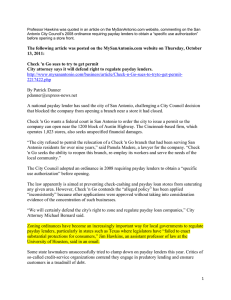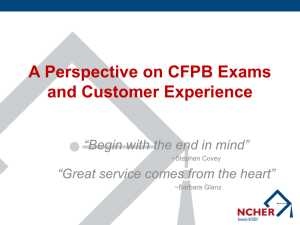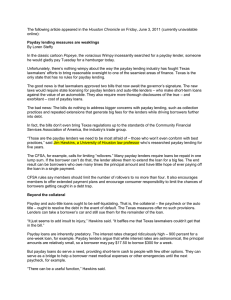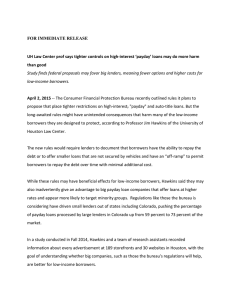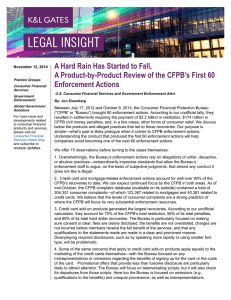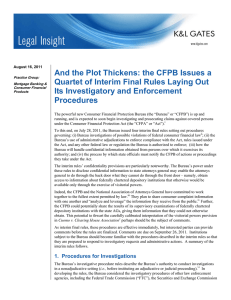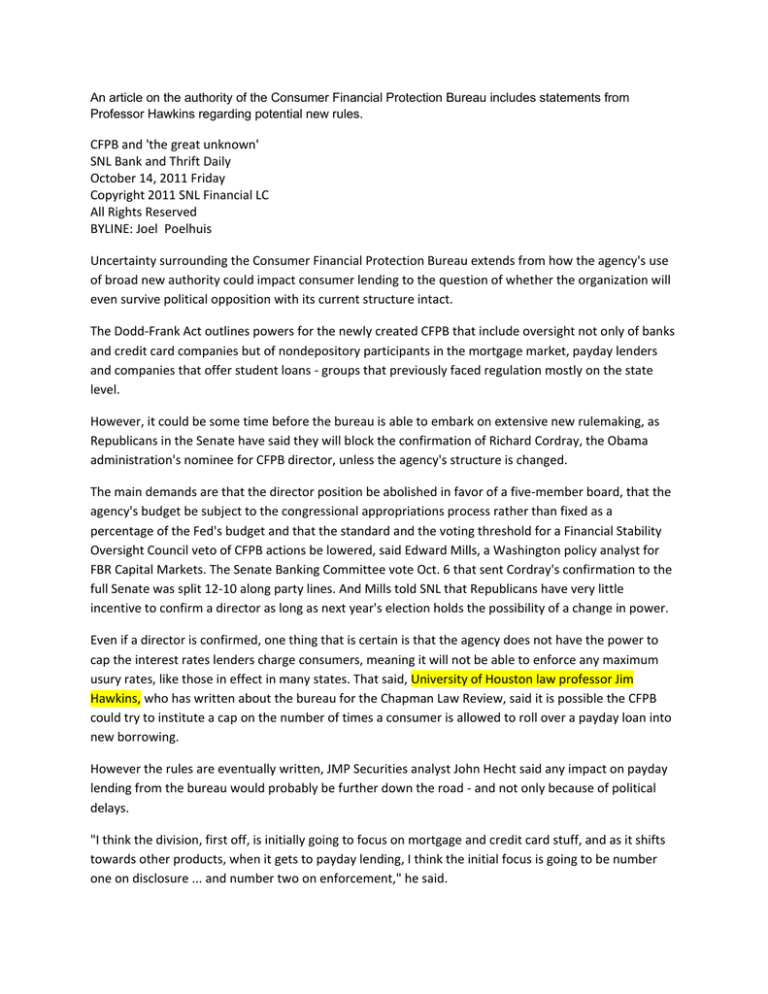
An article on the authority of the Consumer Financial Protection Bureau includes statements from
Professor Hawkins regarding potential new rules.
CFPB and 'the great unknown'
SNL Bank and Thrift Daily
October 14, 2011 Friday
Copyright 2011 SNL Financial LC
All Rights Reserved
BYLINE: Joel Poelhuis
Uncertainty surrounding the Consumer Financial Protection Bureau extends from how the agency's use
of broad new authority could impact consumer lending to the question of whether the organization will
even survive political opposition with its current structure intact.
The Dodd-Frank Act outlines powers for the newly created CFPB that include oversight not only of banks
and credit card companies but of nondepository participants in the mortgage market, payday lenders
and companies that offer student loans - groups that previously faced regulation mostly on the state
level.
However, it could be some time before the bureau is able to embark on extensive new rulemaking, as
Republicans in the Senate have said they will block the confirmation of Richard Cordray, the Obama
administration's nominee for CFPB director, unless the agency's structure is changed.
The main demands are that the director position be abolished in favor of a five-member board, that the
agency's budget be subject to the congressional appropriations process rather than fixed as a
percentage of the Fed's budget and that the standard and the voting threshold for a Financial Stability
Oversight Council veto of CFPB actions be lowered, said Edward Mills, a Washington policy analyst for
FBR Capital Markets. The Senate Banking Committee vote Oct. 6 that sent Cordray's confirmation to the
full Senate was split 12-10 along party lines. And Mills told SNL that Republicans have very little
incentive to confirm a director as long as next year's election holds the possibility of a change in power.
Even if a director is confirmed, one thing that is certain is that the agency does not have the power to
cap the interest rates lenders charge consumers, meaning it will not be able to enforce any maximum
usury rates, like those in effect in many states. That said, University of Houston law professor Jim
Hawkins, who has written about the bureau for the Chapman Law Review, said it is possible the CFPB
could try to institute a cap on the number of times a consumer is allowed to roll over a payday loan into
new borrowing.
However the rules are eventually written, JMP Securities analyst John Hecht said any impact on payday
lending from the bureau would probably be further down the road - and not only because of political
delays.
"I think the division, first off, is initially going to focus on mortgage and credit card stuff, and as it shifts
towards other products, when it gets to payday lending, I think the initial focus is going to be number
one on disclosure ... and number two on enforcement," he said.
Jamie Fulmer, a representative for Advance America Cash Advance Centers Inc., one of the nation's
largest payday lenders, said the company doesn't necessarily oppose additional disclosure
requirements, as long as they are applied evenly throughout the industry. Hecht, who covers the payday
lending sector, added that most short-term lenders are used to dealing with state regulation and some
federal oversight already.
"Adding another layer of regulations would be a hassle and would potentially cost them, but I think they
could accommodate it in terms of registering and so forth," Hecht said.
Some analysts believe the biggest impact on the sector won't be seen for some time, but Hawkins said
that while it is possible the CFPB will turn its attention to higher-dollar industries such as mortgages first,
the agency could also see payday lending as "low-hanging fruit," ripe for introductory regulation.
"Some of the other financial products will take a lot more research and a lot more fight to get something
done on," Hawkins said, surmising that the bureau could use rulemaking for the sector to establish itself.
This would be welcomed news for Kathleen Day, a representative for the consumer advocacy group
Center for Responsible Lending, who said heightened supervision of specialty lenders by the CFPB is
essential to provide a level playing field for banks and nonbanks and to avoid a "race to the bottom" in
terms of consumer practices.
And while the political stalemate means it does not look likely that any new layers will be piled on soon,
Mills said in the meantime that the Federal Trade Commission has stepped up enforcement of existing
regulation regarding deceptive acts and practices in payday lending.
"I think it will be interesting to see what extent, on the federal level, the FTC tries to exert any
responsibility on nonbank financials," Mills said.
While the outlook is still murky on what rules the agency will enact or when it will be in the position to
enact them, some of the worst fears of nondepository lenders have subsided somewhat.
"A fear that a lot of alternative financial providers might have had that 'their goal was to shut us down
immediately' - I don't think that's much of a risk," said Hawkins. "It seems like it's much more likely that
they'll focus on disclosure-based rules."
Some of the CFPB's authorities have yet to be defined, such as a clause that authorizes it to prohibit
"unfair, deceptive, or abusive" practices. Hawkins said that the "abusive" wording is novel enough to
give the agency quite a bit of latitude in defining the term. It could possibly enable the outright ban of
certain types of business, Mills said, though he added the scope of enforcement likely to result from that
part of the law is still opaque.
"That is the great unknown," Mills said.
LOAD-DATE: October 20, 2011


